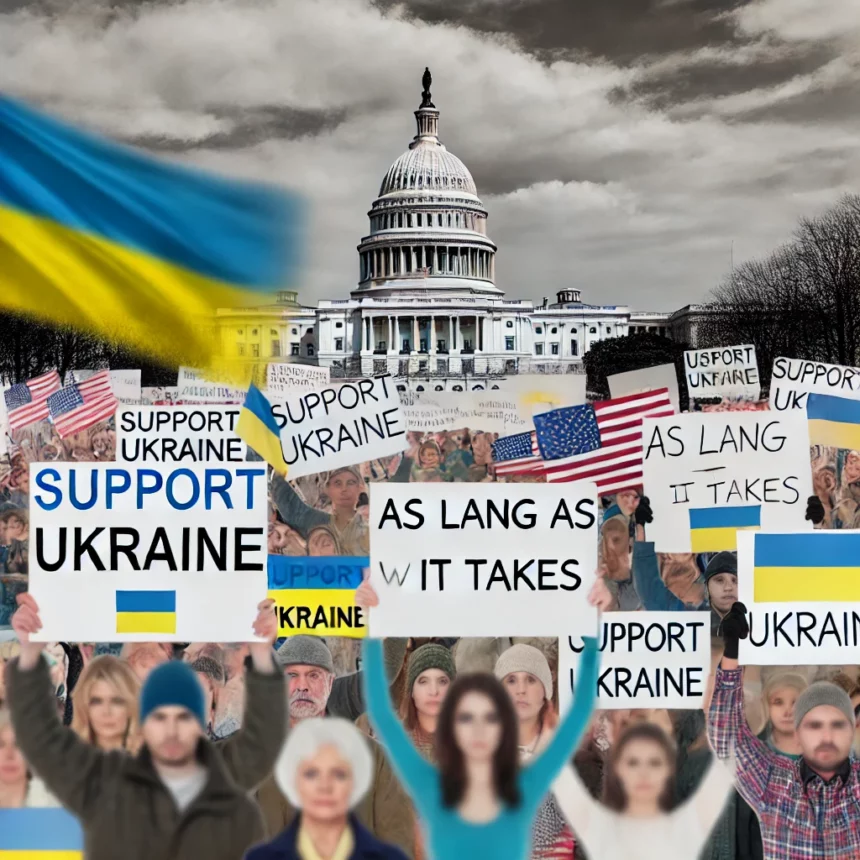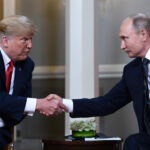Summary by Geopolist | Istanbul Center for Geopolitics:
The essay examines the increasing American endorsement for ongoing assistance to Ukraine, notwithstanding previous apprehensions regarding potential decline in popular support. According to a University of Maryland study, 48% of Americans express a desire for the United States to provide help to Ukraine for an indefinite period of time. A substantial proportion of Democrats (63%) and an increasing number of Republicans (37%) are in favour of this, representing the highest level of bipartisan agreement since early 2023.
The report emphasizes that although Republicans have shown less support for Ukraine in recent months, there has been a surge in support within the party. Despite the anti-Ukraine sentiments expressed by certain Republican contenders, such Donald Trump and J.D. Vance, who have voiced their criticism of U.S. assistance to Kyiv, this support continues. Conversely, Democrats maintain a high level of unity in their backing of Ukraine’s endeavours to counter Russian aggression.
In spite of this increase in support, the number of Americans who believe that Ukraine is winning the war has decreased, with only 21% of Americans expressing confidence in Ukraine’s success. The public’s perception of Ukraine’s financial and military aid is also divided. Republicans are more inclined to perceive the current funding levels as excessive, while Democrats are inclined to believe that they are appropriate or even insufficient.
With another election season quickly approaching in the United States, this change in public opinion could have a significant impact on future decisions made about Ukraine policy.
Read the full article below.
More Americans want the US to stay the course in Ukraine as long as it takes
Just before the recent advance of Ukrainian forces into Russian territory, there were signs that Americans were becoming somewhat less confident about Ukraine’s prospects in the war with Russia. Add to this that the United States is in the middle of a heated election season where Republican politicians have been less supportive of backing Ukraine, one might have expected a drop in American public support for Kyiv.
Yet, our new University of Maryland Critical Issues Poll with SSRS shows robust, even increasing, support for Ukraine.
The poll was carried out by SSRS among a sample of 1,510 American adults from their probability-based online panel, in addition to oversamples of 202 Blacks and 200 Hispanics, July 26-August 1, just before the Ukrainian incursion into Russia’s Kursk region. The margin of error is +/- 3.0 %. Here are some key takeaways.
Americans across the partisan divide are far more sympathetic to Ukraine than to Russia
A strong majority of Americans across the political spectrum sympathize more with Ukraine than Russia in the ongoing war: 62% of respondents express more sympathy with Ukraine than Russia, including 58% of Republicans and 76% of Democrats. At the same time, just 2% of respondents said they sympathized more with Russia in the conflict, including 4% of Republicans and 1% of Democrats. Republicans (20%) were more likely than Democrats (7%) to say they sympathized with neither side, while equal numbers of Republicans and Democrats (5%) said they sympathized with both sides equally.
More Americans want the United States to stay the course in supporting Ukraine as long as it takes
The percentage of respondents who said they want the United States to stay the course in supporting Ukraine grew from our October 2023 poll, reaching the highest level in our tracking since the spring of 2023. In our latest survey, 48% of all respondents said that the United States should support Ukraine as long as the conflict lasts, including 37% of Republicans and 63% of Democrats. All these numbers are new highs in our four polls since March-April 2023.
This shift among Republicans is especially striking considering recent campaign statements by the Republican candidates for president and vice president, Donald Trump and J.D. Vance. Both members of the Republican ticket have made statements opposing further U.S. military aid to Ukraine.
Fewer Americans say Ukraine is winning and Russia is losing
Since the start of the Russian invasion of Ukraine, our polls have tracked the American public assessment of Russia’s and Ukraine’s performance and prospects in the war, as we had reason to think that this assessment might influence the degree of public support for backing Ukraine. In the previous three polls, since March-April 2023, we found little change in that assessment. In the latest poll, there was a marked drop in the assessment that Ukraine is winning and Russia is losing.
Overall, 30% of respondents said Russia is failing in the latest poll, compared to 37% in October; and 21% said Ukraine is succeeding, compared to 26% in October. A plurality of about one-third said each side was neither winning nor losing. Democrats were more likely to think Ukraine (29%) is winning compared to those who said the same about Russia (9%). Republicans were more likely to express equal attitudes about the extent to which Russia (17%) and Ukraine (17%) are winning.
Fewer Americans view current levels of Ukraine funding as about right
American public attitudes on the level of funding for Ukraine remain highly partisan, with more Republicans saying the level is “too much” (52%) and more Democrats saying it’s about “the right level” (39%). Fewer respondents to the question about the level of U.S. support said, “they didn’t know” (26% compared to 33% last October). At the same time, there was an increase in the overall respondents who said the United States is spending too much (35% compared to 29% in October), and there was a simultaneous increase among those who said it is spending too little (15% compared to 10% in October).
The percentage of respondents saying that U.S. support for Ukraine is at the right level has dropped from 28% last October to 24% in July-August, with Republican support dropping from 18% to 15% and Democratic support dropping from 41% to 39%.
Americans support encouraging Ukraine to engage in conflict-ending diplomacy
We asked: “How much would you support or oppose the United States urging Ukraine to engage in diplomatic negotiations with Russia and the United States as soon as possible to end the war in Ukraine?”
We found strong bipartisan support for American urging of Ukraine to engage in diplomacy with Russia, though Republican support is more intense. Overall, 77% of respondents were supportive of diplomacy, with 40% saying they “strongly support” and 37% supporting “somewhat.” Republicans were more “strongly” supportive (53%) compared to Democrats (33%).
Conclusion
Before the recent advance of Ukrainian forces into Russian territory, the American public was growing less confident about Ukraine’s prospects in the war. Surprisingly, this has not undermined overall public support for Ukraine, especially the expressed commitment to stay the course for as long as it takes, which increased since last October. However, attitudes toward the level of support, while partisan, indicated some decline: A 6-point increase among those who say the support is too much, compared to only a one-point increase among those who say either that support is at the right level or too little (from 38% in October to 39% in July-August).
The most striking finding is the degree of bipartisan overall sympathy with Ukraine that encompasses majorities of Republicans and Democrats. The significant increase in the percentage of Republicans who want to see the United States stay the course in its support for Ukraine for as long as takes is especially notable as it occurs in the middle of a presidential campaign where the presidential candidates have taken contrasting views that might lead to a deeper partisan public divide. Early reports about the success of the Ukrainian advance into Russia may have impacted U.S. public support for Ukraine further, as in our previous studies, we found a positive correlation between the degree of perceived Ukrainian success on the battlefield and the degree of public willingness to support Ukraine.
Shibley Telhami
Source: Brookings












